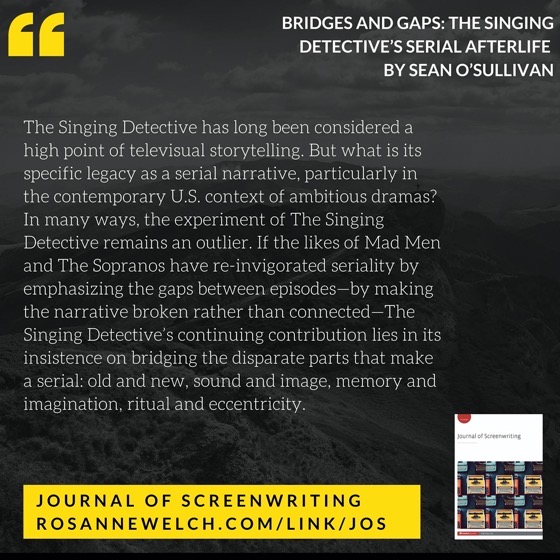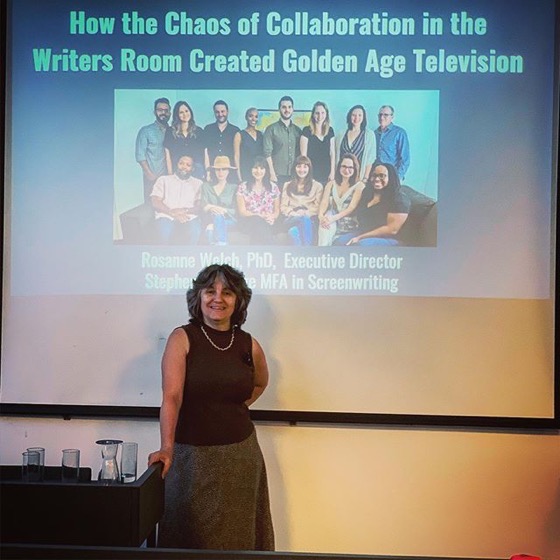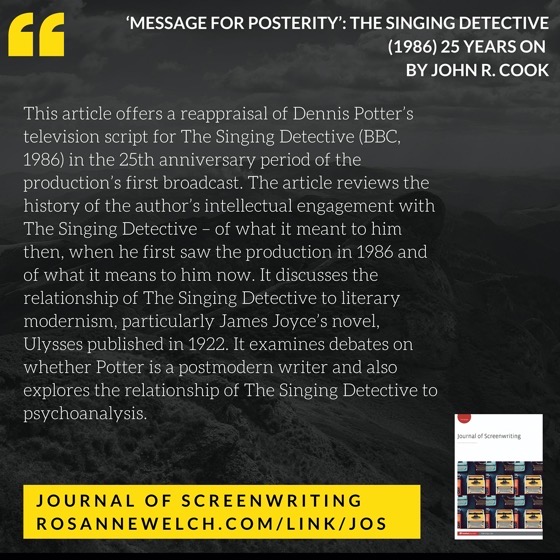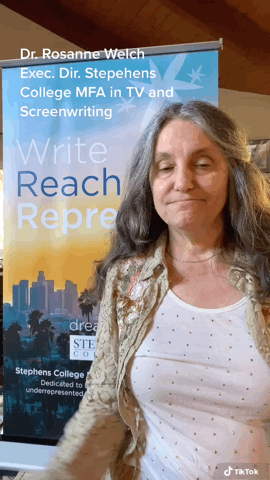Highlighting the articles in the past editions of the Journal of Screenwriting, of which I am the Book Reviews Editor. Hopefully these abstracts will entice you to did a little deeper into the history and future of screenwriting. — Rosanne
Bridges and gaps: The Singing Detective’s serial afterlife by Sean O’Sullivan
The Singing Detective has long been considered a high point of televisual storytelling. But what is its specific legacy as a serial narrative, particularly in the contemporary U.S. context of ambitious dramas? In many ways, the experiment of The Singing Detective remains an outlier. If the likes of Mad Men and The Sopranos have re-invigorated seriality by emphasizing the gaps between episodes—by making the narrative broken rather than connected—The Singing Detective’s continuing contribution lies in its insistence on bridging the disparate parts that make a serial: old and new, sound and image, memory and imagination, ritual and eccentricity.
The Journal of Screenwriting is an international double-blind peer-reviewed journal that is published three times a year. The journal highlights current academic and professional thinking about the screenplay and intends to promote, stimulate and bring together current research and contemporary debates around the screenplay whilst encouraging groundbreaking research in an international arena. The journal is discursive, critical, rigorous and engages with issues in a dynamic and developing field, linking academic theory to screenwriting practice.
Get your copy and subscription to the Journal of Screenwriting Today!
* A portion of each sale from Amazon.com directly supports our blogs
** Many of these books may be available from your local library. Check it out!


![09 More on Stephen J. Cannell from How The Chaos Of Collaboration in the Writers Room Created Golden Age Television [Video]](https://rosannewelch.com/wp-content/uploads/2021/04/srn-porto-09.png)


![Screenwriting Question #3 : Act lengths in TV scripts via TikTok [Video]](https://rosannewelch.com/wp-content/uploads/2021/04/swq-003.gif)
![Screenwriting Question 2: Do Act Breaks Still Matter Even On Streaming Shows? via TikTok [Video]](https://rosannewelch.com/wp-content/uploads/2021/04/swqq-002-act-breaks.gif)

![08 Stephen J. Cannell and Adam-12 from How The Chaos Of Collaboration in the Writers Room Created Golden Age Television [Video]](https://rosannewelch.com/wp-content/uploads/2021/04/srn-porto-08.png)

![Have questions about the craft and/or business of screenwriting for film and TV? Drop them in the comments! via TikTok [Video]](https://rosannewelch.com/wp-content/uploads/2021/04/rmw-ask-me-questions-tt.gif)
![07 The Writer’s Voice from How The Chaos Of Collaboration in the Writers Room Created Golden Age Television [Video]](https://rosannewelch.com/wp-content/uploads/2021/04/srn-porto-07-1.jpg)
![Drs. Rosanne Welch and Dr. Sarah Clark discuss The Monkees “I’ve Got a Little Song Here” episode on the Zilch Podcast’s Monkees 101 Series [Audio]](https://rosannewelch.com/wp-content/uploads/2021/01/RMW-Rosanne-Signature-for-Web.png)
![Drs. Rosanne Welch and Dr. Sarah Clark discuss The Monkees “I’ve Got a Little Song Here” episode on the Zilch Podcast's Monkees 101 Series [Audio]](https://rosannewelch.com/wp-content/uploads/2021/03/Zilch164sm.jpg)